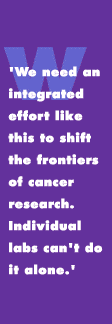 Teaming
up to fight cancer The possibilities, said Matthews, are limitless. "Our challenges are two-fold: to create new technologies for cancer researchers and to educate them about what's possible," he said. "Prior to this collaboration, not many people knew that accelerator mass spectrometry could be used to monitor real-time metabolism of drugs." Or how lasers could be used to find cancer. One of Demos' goals is to develop a light sensor device that can find tiny lesions using fiber- optic sensors the width of a human hair. "If we can use optical technologies, surgeons could get the pathological information they need while making surgical biopsies much less invasive," said Demos, whose quest is personal as well as professional. He's seen loved ones struggle with the disease, and in 1988, his wife died of liver cancer at age 27. It remains a motivating force in his research. "We
knew how to do this in a lab but we needed the biological component
- the tissue samples. Before, I didn't have access to a clinical
facility," he said. "Now I do."
Home |
Table of Contents |
To our Readers |
Building on Basics UC Davis Health System | © 2000, 2001, 2002 UC Regents. All rights reserved. |
 |
